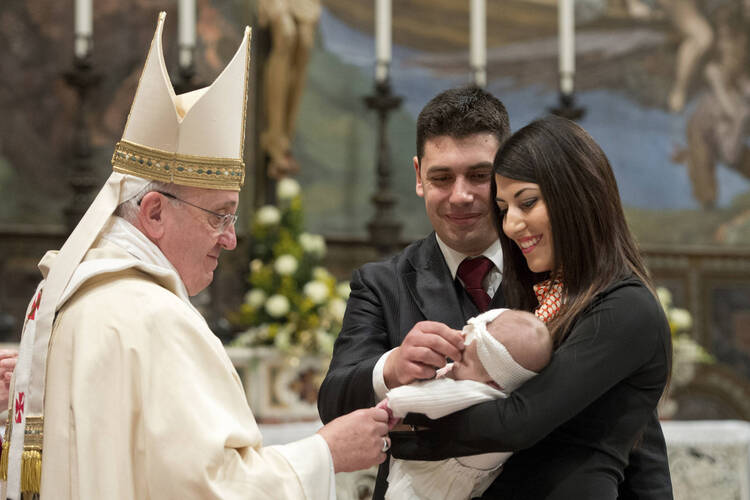Bad news about the family alarms both government and religious leaders. More than ever it is obvious that only effective families can ensure a population’s health, economic and social welfare. The church also knows that it depends upon families for faithful future members. In the United States today the breakdown of marriage and family is producing deep concern, particularly over the future of children. At the same time the increase of the ‘religiously nonaffiliated,’ or ‘nones’ forces the church to confront the fact that thousands of former Catholics and their families have departed the fold.
Such concerns have prompted Pope Francis to call a Vatican Synod aimed at supporting and renewing Catholic family life. Catholics have long acknowledged the family as the ‘domestic church’ and the ‘school of Christianity.’ It is the primary cell of the larger body. Clearly, the life of the family and the life of the whole church are interdependent. They flourish or fail together—and affect the world.
It is hopeful see the positive signs that appear. Religious practice is higher in more educated and more affluent families who are also more stable with less divorce. They also enjoy better health and more social capital. Their well-parented children have chances for future success in life. These are “the Haves” to whom more is being given. They are also part of what has been seen as an unexpected global pro-family trend.
According to family sociologists Gosta Esping-Andersen and Francesco C. Billari, writing in the March 2015 Population and Development Review, a surprising global ‘reversal’ in ‘family erosion’ is taking place. If it proves permanent then the need for a “Re-theorizing of family demographics” is in order. The retreat from marriage and childrearing by educated newly economic independent women has not materialized. Rather, a pro-family revival is observed with an embrace of previous levels of fertility. These demographers make their case for a turnaround with graphs, statistics, table and formulas but the gist of the message is clear.
The causes for the pro-family revival are the spread of feminist influenced norms of gender equality and gender equity in marriage. The turnaround rests on the rapid diffusion of goals of equality, “gender-symmetric arrangements” and more social policies that make it easier to reconcile family and work. Egalitarianism in marriage has spread and encourages pro-family revivals—even in what they call “laggard societies.” There is a message here for governments and for the church. As the Synod on the Family reconvenes they will do well to emphasize the adoption of norms of gender equality, gender equity and gender-symmetric arrangements supported by government and communal policies of support.
This affirmation of equality is in accord with the Gospel message. Human beings are equal children of God made in God’s image and saved by Christ. This revolutionary Christian good news of equality turned the ancient world upside down. Male and female, Jew and Greek, slave and free were united in Christ. Women and slaves flocked to the early Church’s saving and liberating unity.
Inevitably, conflict erupted with the inequality and male dominance of the hierarchical Roman world and family norms. The patriarchal head of a family exercised control over wives, concubines, sons, children, slaves, animals and other forms of property. Powerful families competed for power, status and wealth, so in the interest of family ambition, fathers could force daughters to marry, wives to divorce, infants to be smothered or exposed. It was a brutal, unequal system that directly conflicted with Christ’s command to love God, love one another as one’s self and humbly serve others as equals. Alas, as in many other cultures, the most necessary and naturally altruistic institution of the family could be perverted. And over the centuries the church also succumbed to the world and failed its own Gospel message.
But since Vatican II we know we are a learning church, ever on a pilgrimage to follow God’s will. Can we now hope that a Christian renewal of the family is happening?








